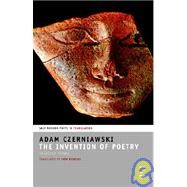- ISBN: 9781844710911 | 1844710912
- Cover: Paperback
- Copyright: 4/30/2005
'Adam Czerniawski's poetry springs from a conjunction of Polish and English (or perhaps European) culture. Deeply rooted in the Polish language, he is at the same time a poet of universal themes observed from a wide perspective of the Western world. I would even claim that this poetry springs from a different basis of culture and literary tradition, that he has managed to set himself free from many complexes of contemporary Polish poetry, to grasp and see them from a global perspective. Additionally, there is his special position as a poet standing outside the émigré cultural life, which gives him the advantage of distance, of reserve and of being above the current disputes and entanglements. The art which he practises enables us to count him among poets of culture full of erudition and various tropes which bear witness to his inheriting the great tradition of European culture.' -Konstanty PieDkosz, Literary critic 'My favourite poems by Adam Czerniawski include "Seaside Holiday", "Interior Topography" (one of his best poems), "You and I", "Man", "Science Fiction", "Listening to a Schubert Quartet", "World", "Bridge", "Fish", "Triangle", "A View of Delft", "Evening, or a Field of Vision", "Token of Remembrance" and "Golden Age". These poems display a dialectical synthesis of feeling and awareness; without falling below the level of the author's understanding - and let's note that it is a philosophical understanding rare among Polish poets (MiBosz is a philosopher of a totally different kind) - these poems do not leave feelings behind, and this is precisely what works in their favour.' -Bogdan Czaykowski, Poet and scholar 'Consistently labelled in Polish criticism as a "poet of culture," Czerniawski, like CzesBaw MiBosz, belongs to the category of writers who express their struggle with culture and history in profoundly personal terms. His poetry is marked by a return to mythological topoi (e.g., "Love") and to such classical motifs as ars longa vita brevis (e.g., "Token of Remembrance"). These returns, however, offer no consolation for the sense of historical and existential displacement; rather, culture tempts with the promise of aesthetic redemption (in this, Czerniawski also resembles Zbigniew Herbert) but ultimately agitates by bringing into the open that from which one longs to escape - the palpability of history, of "today, though somewhat far." Czerniawski's sense of history reflects both the experience of his generation and his own "obsessive memory [of an] annihilated childhood." He comments, for instance, on the traumatic divide in his biography, "for those tainted with the consciousness of 'other days' biography falls into before and after ." He recalls the emotional impact of the outbreak of the war on the child that he was: "So not even a global picture of the September campaign, but simply stray scenes rooted in the memory of the child. They are enough. And who would have thought that already at that age it is possible to shoulder the humiliation of an entire people?" (" The Ages Speak , or what's new in History"). 'Higgins strives to be faithful to Czerniawski's style and tone (including the use of British English to reflect the author's environment), and those able to follow both the Polish and English can appreciate the consistency of his renditions. Higgins's translations read smoothly and show respect for the original. Similar qualities come across in Higgins's sensitive introduction to this generally laudable volume.' -Prof. Joanna Ni yDska 'Thus the reader will find here not only the long and the short of him - as in the concise "Oxford" (an almost sentimental statement of the poet's affection for a mythic England) and the extensive "Mirrors and Reflections" (a moving meditation on being in the world) - but also the more familiar middle ground, Czerniawski's preferred poetic d







